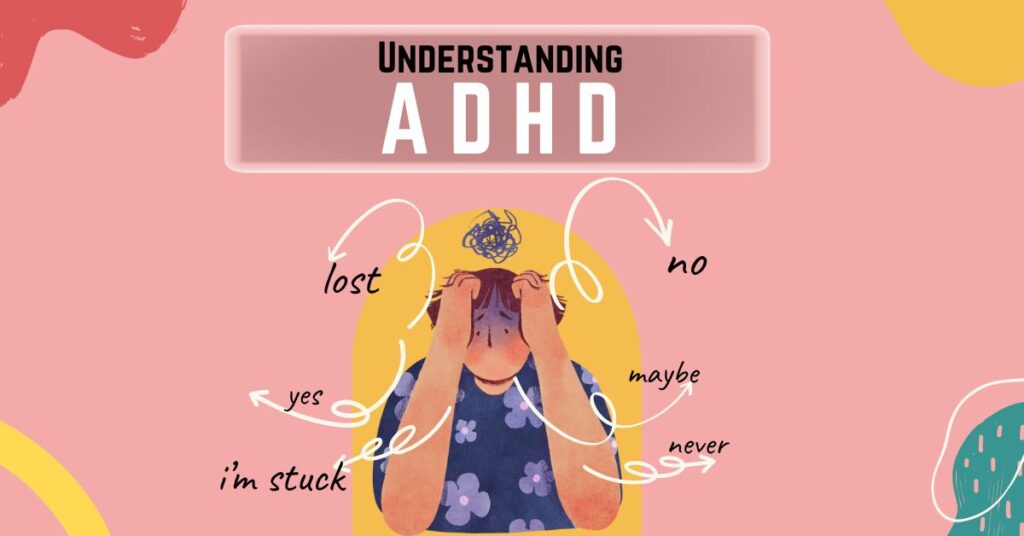
What is ADHD (attention deficit hyperactivity disorder)?
ADHD, is a neurodevelopmental condition impacting individuals of various age groups. It is characterized by chronic patterns of inattention, impulsivity, and hyperactivity, affecting daily functioning. The manifestations of symptoms vary in children and adults, with inattention, hyperactivity, and impulsivity being key indicators. This article explores ADHD’s definition, causes, diagnosis, treatment, and daily challenges.
ADHD brains, wired differently, excel in creativity and hyperfocus. While presenting challenges, these unique qualities can be strengths. Accepting neurodiversity is crucial, leading to innovative approaches like strength-based interventions. Embracing diverse cognitive perspectives fosters awareness and societal acceptance, creating a more inclusive and compassionate future.
Diagnosis and Evaluation of ADHD:
ADHD diagnosis involves a comprehensive process, utilizing standardized criteria from the DSM-5. Medical and psychological assessments, along with input from various sources, contribute to accurate diagnoses. The DSM-5 identifies two main symptom categories: inattention and hyperactivity-impulsivity.
In the global healthcare landscape, ADHD is coded as F90 in the International Classification of Diseases (ICD), streamlining identification. Recognizing diverse signs, such as organizational challenges and impulsivity, is crucial for timely intervention.
Signs and Symptoms
- Inattention Symptoms: ADHD is characterized by persistent patterns of inattention.
- Lack of Attention to Details: Often makes careless mistakes in school or work due to overlooking details.
- Difficulty Sustaining Attention: Struggles to remain focused during lectures, conversations, or reading.
- Poor Listening Skills: Appears not to listen when spoken to directly, with the mind wandering.
- Failure to Follow Instructions: Frequently does not follow through on instructions, leading to incomplete tasks.
- Organizational Challenges: Difficulty organizing tasks, managing sequential activities, or keeping belongings in order.
- Avoidance of Mental Effort: Avoids tasks requiring sustained mental effort, such as homework or paperwork.
- Losing Items: Often loses necessary items for tasks, like school materials or keys.
- Easily Distracted: Easily distracted by unrelated stimuli, affecting concentration.
- Forgetfulness: Frequently forgets daily activities or chores, even appointments or returning calls.
- Hyperactivity and Impulsivity Symptoms: Apart from inattention, ADHD involves hyperactivity and impulsivity. To meet the diagnostic criteria, an individual must exhibit six or more of the following symptoms for at least six months:
- Fidgeting and Squirming: Often fidgets with hands or feet or squirms in the seat.
- Leaving Seat: Frequently leaves the seat when expected to remain seated, such as in classrooms or offices.
- Inappropriate Running or Climbing: Runs or climbs in situations where it’s inappropriate.
- Inability to Play Quietly: Unable to play or engage in leisure activities quietly.
- Restlessness: Often seems “on the go,” unable to stay still for extended periods.
- Excessive Talking: Talks excessively, often without waiting for a turn in conversations.
- Blurting Out Answers: Blurts out answers before questions are completed.
- Difficulty Waiting: Finds it hard to wait for a turn, frequently interrupting or intruding on others’ activities.
Clinical Evaluation Process:
- Initiating the Conversation:
Individuals facing ADHD challenges seek professional help to address attention, hyperactivity, and impulse control issues. - Compassionate Exploration:
Clients share challenges in a psychologist or psychiatrist’s office, initiating a detailed evaluation process. - Information Gathering:
Detailed medical and family histories provide context, exploring potential genetic factors. Observations across settings offer insights. - Psychological Tests and Rating Scales:
Standardized tests aligned with DSM-5 criteria pinpoint specific symptoms. Ratings from parents, teachers, and caregivers contribute diverse observations. - Social and Emotional Assessment:
The evaluation delves into social and emotional well-being, appreciating inherent strengths alongside struggles. - Differential Diagnosis:
Precision is maintained through differential diagnosis, distinguishing ADHD from similar conditions and preventing mislabeling.
Comprehensive Understanding:
- Nuanced Analysis:
The process ensures a nuanced analysis, guiding practitioners toward accurate understanding and diagnosis. - Tailored Strategies and Support:
Beyond diagnosis, individuals receive tailored strategies, unwavering support, and assurance for a more promising future.
Effective Treatment and Management Strategies for ADHD:
ADHD poses unique challenges, but with tailored strategies, individuals can lead fulfilling lives. The multifaceted approach includes:
- Behavioral Therapy:
- Equips individuals with skills to modify behaviors, enhance focus, and improve impulse control.
- Structured sessions teach organizational techniques and coping mechanisms, fostering self-esteem.
- Neurocognitive Techniques:
- Delve into brain intricacies to enhance cognitive functions.
- Neurofeedback trains the brain for improved focus; cognitive exercises enhance memory and attention.
- Cognitive Behavioral Therapy (CBT) and Psychosocial Interventions:
- Addresses psychosocial concerns, managing anxiety, low self-esteem, and social difficulties.
- Equips individuals with coping strategies and fosters emotional regulation.
- Strength-Based Approaches:
- Recognize inherent talents and abilities, focusing on creativity, problem-solving, and hyperfocus.
- Tailored interventions empower individuals to overcome challenges and embrace unique capabilities.
- Medication Management:
- Stimulants or non-stimulants regulate neurotransmitter imbalances, improving attention and impulse control.
- Optimal dosage and minimal side effects are ensured under healthcare professionals’ guidance.
- Parental and Educational Support:
- Parental training provides effective strategies for supportive home environments.
- Individualized Education Programs (IEPs) in schools offer accommodations for academic success.
- Mindfulness and Relaxation Techniques:
- Practices like meditation and yoga instill calm, focus, and emotional regulation.
- Regular use empowers individuals to manage distractions and impulsivity.
IMPACT OF ADHD IN CHILDREN VS ADULTS
Attention Deficit Hyperactivity Disorder (ADHD) is often thought of as a childhood condition, but its impact is far-reaching, affecting individuals well into adulthood. While the core symptoms of inattention, hyperactivity, and impulsivity remain consistent, how these symptoms manifest and the challenges they present can significantly differ between children and adults. In this article, we embark on a comprehensive exploration of ADHD, highlighting the intricate variations in its recognition, diagnosis, impact, coping mechanisms, emotional well-being, treatment, and effects on relationships as it progresses from childhood to adulthood. Understanding these distinctions is pivotal for accurate diagnosis, tailored interventions, and holistic support throughout an individual’s lifelong journey with ADHD.
Recognition and Diagnosis:
- Children: ADHD symptoms often become noticeable in early childhood when a child struggles to pay attention in class, frequently fidgets, or finds it challenging to complete tasks. Teachers and parents observe these behaviors, leading to assessments by specialists. Academic difficulties, impulsive behavior, and challenges in social interactions trigger concern.
- Adults: In adulthood, ADHD symptoms may become subtler but equally disruptive. Adults might encounter persistent issues in time management, organization, and completing tasks. Forgetfulness, difficulty in maintaining focus, and impulsivity can affect work and personal relationships. These symptoms are often misconstrued as stress, lack of discipline, or signs of other mental health issues, delaying diagnosis and intervention.
Impact on Education and Work:
- Children: ADHD affects a child’s ability to concentrate in class, leading to academic struggles, unfinished assignments, and difficulty following instructions. Hyperactivity might result in disruptive behavior, impacting social interactions with peers. These challenges can lead to lower academic achievement and self-esteem issues.
- Adults: In the workplace, adults with ADHD may find it hard to meet deadlines, stay organized, and complete tasks accurately. They may frequently switch jobs due to dissatisfaction or difficulties coping, affecting their financial stability and career trajectory. Challenges in concentration and impulsivity can impair professional relationships and job performance.
Coping Mechanisms and Challenges:
- Children: Behavioral therapy and school accommodations are crucial for children. Behavioral therapy sessions teach children organizational skills, impulse control, and social interaction strategies. These interventions help them manage their challenges effectively. Children often display hyperactivity, restlessness, and difficulty adhering to routines, impacting their daily lives.
- Adults: Adults develop coping strategies such as creating detailed schedules, using reminders, and employing organizational tools.
Emotional Well-being:
- Children: ADHD can lead to emotional struggles in children, including frustration due to academic difficulties, low self-esteem from social challenges, and feelings of isolation. Peer relationships can be strained, leading to a sense of exclusion and loneliness.
- Adults: Emotional challenges persist into adulthood, often manifesting as anxiety and depression. Difficulty in managing emotions can strain relationships and lead to social isolation. Adults may experience chronic feelings of inadequacy, impacting self-esteem and mental health.
Treatment Approaches:
- Children: Treatment for children often involves a combination of behavioral therapy and, in some cases, medication. Behavioral interventions teach essential life skills and coping mechanisms. Medications help regulate neurotransmitter imbalances, improving focus and impulse control.
- Adults: Adult treatment plans usually include cognitive-behavioral therapy (CBT) to manage emotional challenges. Medications, including stimulants or non-stimulants, are prescribed to regulate brain chemistry. Behavioral therapy focuses on developing coping mechanisms, while coaching helps in enhancing organizational skills and time management.
Impact on Relationships:
- Children: Children with ADHD might struggle to maintain friendships due to impulsivity and difficulties in social cues. Family relationships can be strained due to behavioral issues, leading to conflicts and misunderstandings.
- Adults: Adults with ADHD often face challenges in intimate relationships. Forgetfulness, emotional dysregulation, and impulsivity can strain marriages and partnerships. Maintaining friendships can be difficult, leading to social isolation and feelings of loneliness.
ADHD as a Lifelong Journey:
- Lifelong Nature: ADHD is commonly regarded as a lifelong condition, with individuals often experiencing challenges that persist into adulthood.
- Evolution of Symptoms: While symptoms may evolve over time, the core challenges related to attention, hyperactivity, and impulse control tend to persist.
- Effective Coping Strategies: Despite its persistence, appropriate interventions can empower individuals to learn effective coping strategies, enabling them to lead successful and fulfilling lives.
- Early Intervention Importance: Early diagnosis and tailored support significantly improve outcomes, underscoring the importance of recognizing and managing ADHD from childhood into adulthood.
Common Misconceptions About ADHD:
- Myths Dispelled:
- ADHD is not a result of a lack of discipline or poor parenting.
- It extends beyond hyperactive children, encompassing inattentive subtypes and adult cases.
- Biological Origins:
- ADHD is recognized as a genuine neurodevelopmental disorder with biological origins, challenging misconceptions about its nature.
- Deserving Acknowledgment:
- Dispelling myths is crucial in fostering understanding and empathy, acknowledging ADHD as a legitimate condition that deserves acknowledgment and support.
Coexisting Conditions and ADHD:
- Additional Challenges:
- Individuals with ADHD often face coexisting conditions such as anxiety, depression, or learning disabilities.
- These conditions can complicate the diagnosis and treatment of ADHD.
- Comprehensive Intervention:
- Recognizing and addressing coexisting challenges alongside ADHD is crucial for comprehensive and effective intervention.
- Integrated approaches involving healthcare professionals from various specialties help individuals manage multiple conditions simultaneously.
- Enhanced Quality of Life:
- Effectively managing both ADHD and coexisting conditions enhances the overall quality of life for individuals, emphasizing the need for a holistic approach to mental health care.
Inspiron Psychological Wellbeing Centre: Nurturing Minds
In a demanding world, Inspiron is a haven for mental health. Dedicated professionals offer tailored treatments for ADHD, BPD, depression, anxiety, and stress. Key features include a qualified team, diverse therapeutic modalities, comprehensive care with in-house psychiatrists, psychometric assessments for targeted treatment, and a unique Co-therapy Program for confident reintegration. Inspiron is a beacon of hope, providing a holistic, personalized approach for healing, growth, and rediscovering joy.
Written By –
Ms. Sabeera Nowreen
Psychologist




